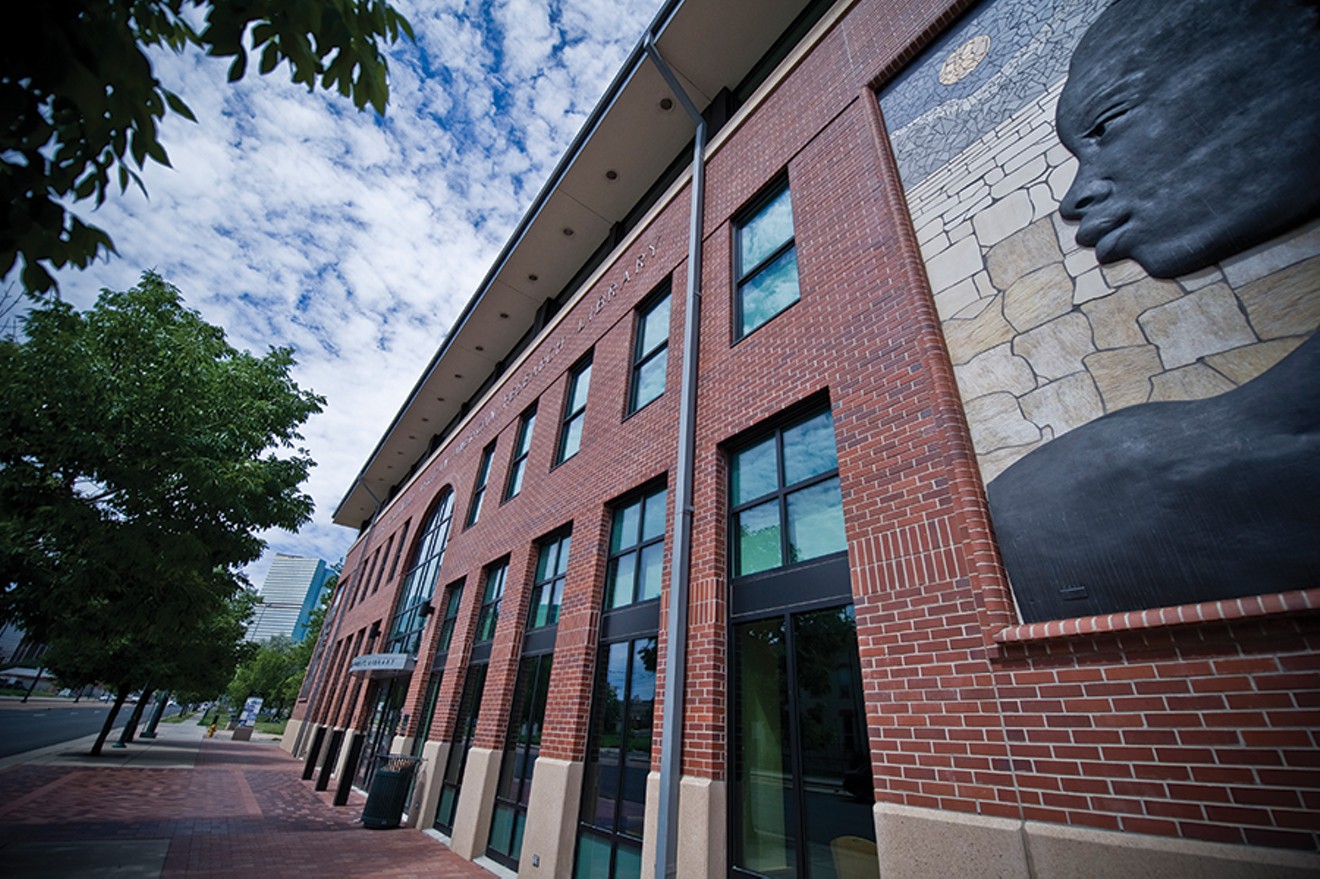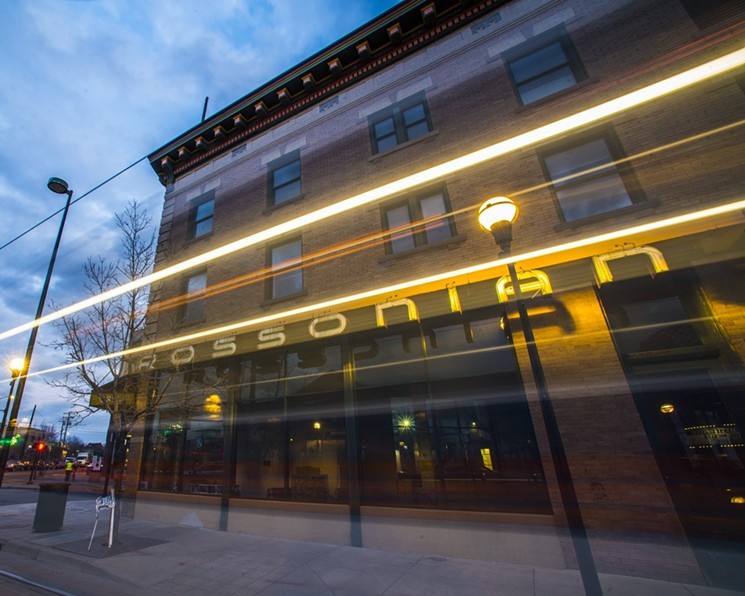"In an effort to reclaim our spaces, our communities, and our history, I have made it my duty to work to regain the essence of Denver Colorado’s historically black neighborhood," writes the author of a petition that went live on Change.org last week: "Revert The Rino District back to its historical name 'The 5 Points.'"
Too late, says Jeff Fard, better known as Brother Jeff. He runs Brother Jeff's Cultural Center on Welton Street in the heart of Five Points, and may well be the heart of Five Points, with a Facebook Live show and newspaper that ties the community together. Still, last year he changed the name of that paper from Five Points News to Five Star News.
That's because the Five Points that was the historic center of Denver's black community, the "Harlem of the West," is definitely history — and was heading that way long before two artists coined the RiNo name for the River North warehouse district and in 2005 founded the RiNo Art District a mile northwest of where five Denver streets come together.
Today, in a city that's just been labeled the second-most gentrified in the country, Five Points has become "perhaps the model of gentrification across the nation," Brother Jeff says. "We're doing it faster, higher."
But not better.
"Five Star News is just like the North Star," he explains. "We're following the North Star to tell our story, the diaspora. Our people at one point were a concentrated neighborhood, but today we're so dispersed. We're being displaced again. Changing the paper's name, it's telling the story of change."
And that change started decades ago, when black Denver residents who'd been redlined into the area that started out as one of Denver's first streetcar suburbs turned it into a vibrant community in the ’20s through the ’40s, full of black-owned businesses and dozens of clubs on Welton Street that drew top-notch entertainers. In the late ’50s and ’60s, many of those residents slowly moved into Denver's newly integrating communities, leaving historic Five Points behind. And over the past two decades, as the area gentrified, more left — this time because it was simply too expensive to stay.
"People think of Five Points nostalgically as a black community," Brother Jeff points out. "But today, while there's some black ownership, it's catering to whites." And the street leading to those very few black-owned businesses — a barbershop, a cafe, Brother Jeff's own cultural center — has become a concrete canyon of high-priced, high-rise apartments that give no hint of what once was there.
"The beauty of Welton has been destroyed," he says. "I like to focus on Welton Street, where the vibrancy was. You're going to have a lot of density, but not the soul of what Five Points represented, because it's been dispersed."
Still, people champion the history, they come down to learn the history, they read the plaques that were put up to mark the city's first cultural historic district. "They tell the history, but they're also tombstones that represent what no longer exists," he says. "If you're really excited about walking through graveyards, maybe all those plaques and name changes are important....
"What Five Points means today, and what it meant then, it's night and day," Brother Jeff points out. "There's a lot of confusion about these symbols about names. And at the end of the day, I'm more interested in the actual control of the assets. You have a lot of a people working on black ownership, but can you keep up with the pace of growth and development that have been orchestrated by rabid capitalism?"
That's a question that's been asked in RiNo, too, where the artists who set up shop in dusty warehouses two decades ago have also been pushed out, as those buildings, too, gave way to a concrete canyon of high-priced, high-rise apartments.
Although Five Points runs all the way to the Platte River on Denver's official map, other communities have carved out identities in this vast stretch, including Curtis Park, which was home to a strong Chicano community in the early ’70s. Before it became RiNo, the blocks around Brighton Boulevard were referred to as "NoDough" — an ironic nod to then-booming LoDo to the south — far more often than they were called Five Points. And when Jill Hadley Hooper and Tracy Weil came up with the RiNo nickname and established the RiNo Art District, their goal was to create a way to live up to the district's motto — "where art is made" — rather than create a tool for out-of-state real-estate tycoons.
"We're an arts nonprofit organization, not a neighborhood," says Weil, who today is the executive director of the RiNo Art District. "As a state-certified art district, we have always been inclusive of the five historic neighborhoods of Globeville, Cole, Five Points and Elyria-Swansea that we are a part of. We are much like the Arts District on Santa Fe in the Lincoln Park neighborhood. We are focused on advocating and promoting the artists, makers, galleries and small businesses in the area."
And at the moment, giving $50,000 in social-impact grants to individuals and organizations there.
Weil will be meeting today with Candi CdeBaca, the councilwoman who represents Five Points and all of the neighborhoods in, under and around that official designation (the RiNo Art District has posted stories written by representatives of several of them), to talk about the petition (which had collected 5,500 signatures by mid-day) and other points of contention. But on one thing, just about everyone can agree:
Gentrification Station should not be the last stop for this historic spot.
[
{
"name": "Air - MediumRectangle - Inline Content - Mobile Display Size",
"component": "12017618",
"insertPoint": "2",
"requiredCountToDisplay": "2"
},{
"name": "Editor Picks",
"component": "17242653",
"insertPoint": "4",
"requiredCountToDisplay": "1"
},{
"name": "Inline Links",
"component": "18838239",
"insertPoint": "8th",
"startingPoint": 8,
"requiredCountToDisplay": "7",
"maxInsertions": 25
},{
"name": "Air - MediumRectangle - Combo - Inline Content",
"component": "17261320",
"insertPoint": "8th",
"startingPoint": 8,
"requiredCountToDisplay": "7",
"maxInsertions": 25
},{
"name": "Inline Links",
"component": "18838239",
"insertPoint": "8th",
"startingPoint": 12,
"requiredCountToDisplay": "11",
"maxInsertions": 25
},{
"name": "Air - Leaderboard Tower - Combo - Inline Content",
"component": "17261321",
"insertPoint": "8th",
"startingPoint": 12,
"requiredCountToDisplay": "11",
"maxInsertions": 25
}
]














